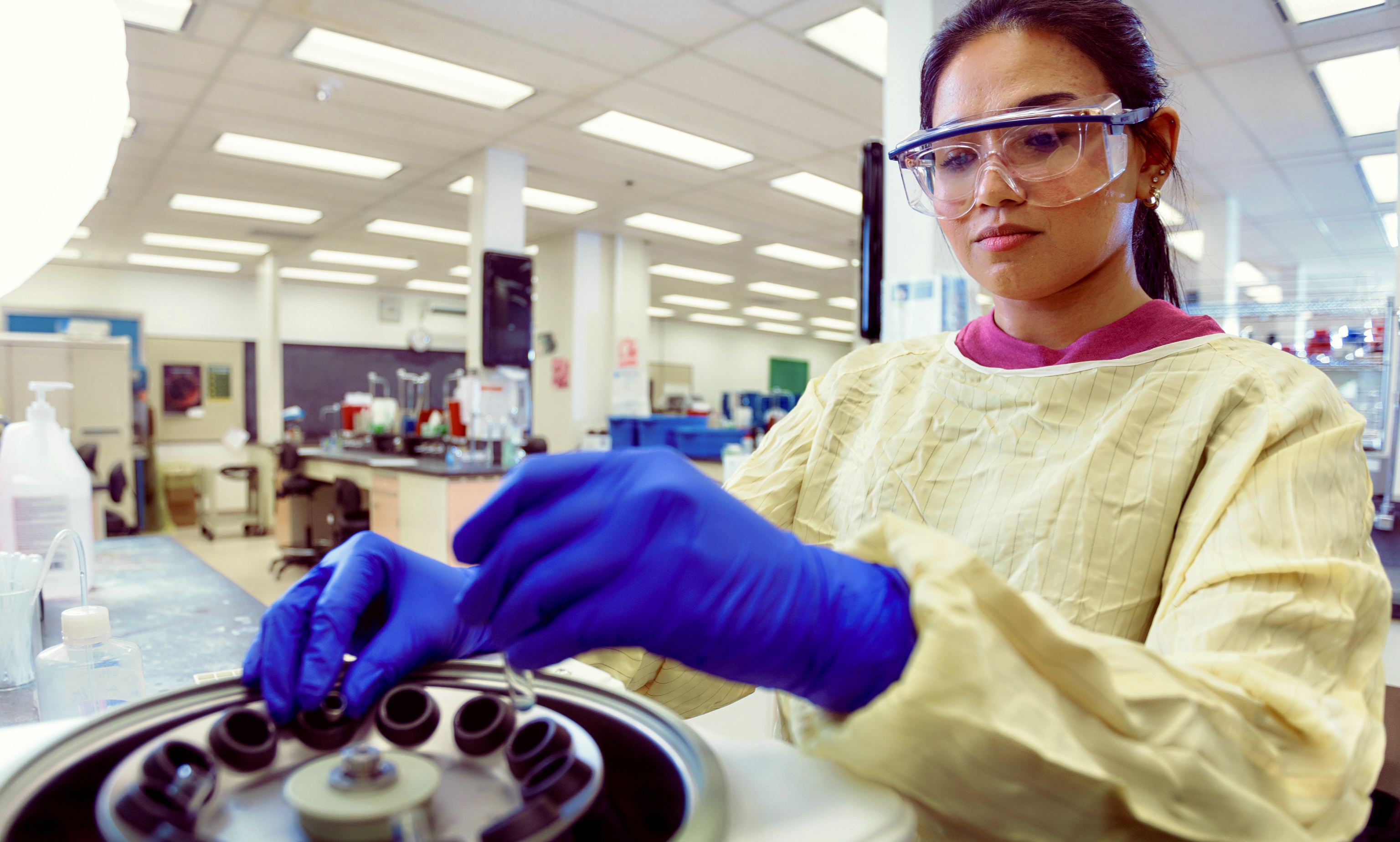Convocation Spotlight: Medical Lab Sciences '24 grad Richen Basig
Sasha Roeder Mah - 5 June 2024

MLS '24 grad Richen Basig.
Medical laboratory sciences graduate Richen Basig is an advocate and a bridge builder, harnessing her seemingly boundless energy to spread the word about the program that has been her home for the past four years and the career she cannot wait to begin.
Basig can’t recall a time in her life when she wasn’t thoroughly engaged in her community. In university, she juggled three different part-time jobs alongside her demanding studies and participation in the University of Alberta’s Medical Laboratory Students’ Association, including as president during 2023-24. High school was much the same — three part-time jobs and membership in a variety of student groups. Even as a young child in the Philippines, she joined many extracurricular activities at school.
When she was 10, Basig and her family moved from the Philippines to Coronation, Alta., a town of about 900 people. After graduating high school she was ready for adventure and embarked on a degree at the University of Ottawa. Finances drove her back to continue in general sciences at the U of A, where one day in early 2020 her curiosity led her to a health sciences workshop set up by the Faculty of Medicine & Dentistry’s MLSA.
“In high school, we didn’t have a lot of laboratory resources but whenever we did get a session in the lab, I just loved it,” she recalls. “I knew I didn’t just want to do theory learning. MLS was very hands-on and at the time I started, there was also a 100 per cent guarantee of a job upon graduation,” she says. “This felt like the perfect fit. I just lit up like a lightbulb!”
Basig is one of thousands of U of A grads whose memories will forever be linked to the pandemic. Within just a couple of weeks of beginning her degree, due to health and safety concerns her cohort of 30 was split in half for the remainder of that year. Even though the program has always been small and tight knit, this division was a challenge to that tradition. “We had just been making friends, and suddenly we were separated,” she remembers. But with her outgoing nature, it didn’t take long to realize she could still get to know everyone; it would just require a little extra effort.
As she graduates this June, Basig is thinking about her favourite memories from that tight-knit community. She has been involved over the past several years with the same workshop where she herself discovered MLS. There — and at other networking events where she proudly sports a name tag that reads “Ask me about MLS!” — she has volunteered, explaining the program to prospective students. Basig loves spending her time in this way, and nothing makes her happier than reconnecting with those same students once they’ve started their degree.
Basig’s desire to open people’s eyes to the intricacies of medical laboratory sciences goes beyond recruitment. For her final-year research project, she conducted an interprofessional education study with a small group of nursing and medical students. “Not a lot of people know what we do and what our scope of practice is — not just the public but also members of the health-care team,” she says. She produced videos of an actor moving about a lab completing typical MLS tasks, showed them to the participants and asked them to share what they had learned. Before seeing the videos, she says, most of the students knew next to nothing about MLS. But after, as she says, “they could barely stop talking about everything they had learned.” In fact, many said that they would like to see this kind of useful information added to their curriculum. “Misunderstandings among the health-care team have adverse effects on patients,” stresses Basig. “We need to come together and recognize that each profession is important.”
Also during her final year, Basig was empowered to extend her advocacy work with a small project initiated through a conversation with Lisa Purdy, the faculty’s assistant dean of equity, diversity and inclusion. When Purdy explained her office had some funding available for outreach initiatives to underrepresented communities, Basig had another of her lightbulb moments — a team of students could connect with schools in rural and Indigenous communities and spread the word about the MLS program.
“Coming into the program from a very small town, I had barely even seen a microscope,” she says. She wants other students growing up in similar situations to be aware of the opportunities in a program like MLS and have the tools to prepare for them. The project is in its infancy and has not yet extended beyond a few Edmonton schools, but along with her team she has laid the groundwork for other passionate MLS students to nurture and expand it outside the city. The aim is to not only eventually open students’ eyes to the possibilities of MLS, but also provide them with the tools and resources, such as textbooks and help with completing applications, that will support their path to admission.
As she looks forward to her first day on the job in the toxicology lab at the University of Alberta Hospital, Basig is passing the advocacy torch on to students still in the program. She plans to continue to volunteer, but she knows she will need to focus on building her career. And, while she’s staying in Edmonton for now, she dreams of one day heading back to the big skies and open spaces of rural Alberta. “I’m young and I’m excited to explore all my opportunities,” she says. “But eventually I would love to return and give back to the kinds of communities where I was raised.”